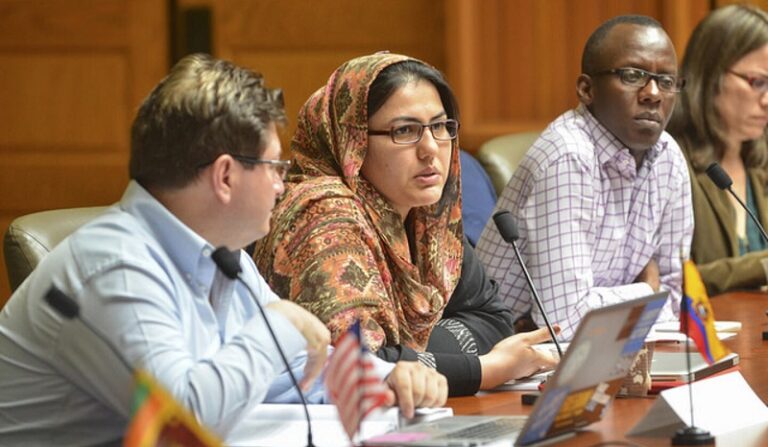Deadline: 14th January 2024
Applications for the Fisher Family Summer Fellows Programme on Democracy and Development 2024 at Stanford University are now open. The Fisher Family Summer Fellows Program on Democracy and Development is a training programme organised annually by Stanford University's Center for Democracy, Development and the Rule of Law (CDDRL) at the Freeman Spogli Institute for International Studies (FSI).
Launched in 2005 and formerly known as the Draper Hills Summer Fellows Program, the programme brings together a group of approximately 28-30 mid-career professionals from countries in transition who are working to promote democratic practices and economic and legal reforms in contexts where freedom, human development and good governance are fragile or at risk. From Afghanistan to Zimbabwe, the programme's participants are selected from hundreds of applicants each year for the significant contributions they have already made to their societies and their potential to make an even greater impact with some help from Stanford.
https://googleads.g.doubleclick.net/pagead/ads?client=ca-pub-7238845118856992&output=html&h=280&slotname=3344323800&adk=1039568208&adf=3049985914&pi=t.ma~as.3344323800&w=742&fwrn=4&fwrnh=100&lmt=1700011513&rafmt=1&format=742×280&url=https%3A%2F%2Fopportunitydesk.org%2F2023%2F11%2F06%2Ffisher-family-summer-fellows-program-on-democracy-development-2024%2F&ea=0&fwr=0&fwrattr=true&rpe=1&resp_fmts=3&wgl=1&uach=WyJXaW5kb3dzIiwiMTAuMC4wIiwieDg2IiwiIiwiMTE5LjAuMjE1MS41OCIsbnVsbCwwLG51bGwsIjY0IixbWyJNaWNyb3NvZnQgRWRnZSIsIjExOS4wLjIxNTEuNTgiXSxbIkNocm9taXVtIiwiMTE5LjAuNjA0NS4xMjMiXSxbIk5vdD9BX0JyYW5kIiwiMjQuMC4wLjAiXV0sMF0.&dt=1700046961147&bpp=2&bdt=664&idt=345&shv=r20231109&mjsv=m202311090101&ptt=9&saldr=aa&abxe=1&cookie=ID%3Dfcd5129b6f6760d0%3AT%3D1700046778%3ART%3D1700046778%3AS%3DALNI_MYXu23f27DzTgXD1NzRSQpdTGreNg&gpic=UID%3D00000cdad79bc280%3AT%3D1700046778%3ART%3D1700046778%3AS%3DALNI_MZXLCQJ04VxSSI2iD_t2dA6j0KknA&prev_fmts=0x0%2C728x90&nras=1&correlator=8142246518026&frm=20&pv=1&ga_vid=736885258.1700046961&ga_sid=1700046961&ga_hid=460485261&ga_fc=0&u_tz=-60&u_his=1&u_h=768&u_w=1366&u_ah=728&u_aw=1366&u_cd=24&u_sd=0.75&dmc=8&adx=337&ady=1420&biw=1790&bih=872&scr_x=0&scr_y=0&eid=44759875%2C44759926%2C44759837%2C44785293%2C44801485%2C31078301%2C44807763%2C44808149%2C44808285%2C44809056&oid=2&pvsid=2814174137550172&tmod=2094404744&wsm=1&uas=0&nvt=1&ref=https%3A%2F%2Fwww.google.com%2F&fc=1920&brdim=0%2C0%2C0%2C0%2C1366%2C0%2C1366%2C728%2C1810%2C872&vis=1&rsz=%7C%7CEebr%7C&abl=CS&pfx=0&fu=128&bc=31&psd=W251bGwsbnVsbCxudWxsLDNd&ifi=3&uci=a!3&btvi=1&fsb=1&dtd=350
Programme Curriculum
The programme's curriculum combines four different session styles, which include:
- The academic sessions provide a framework and theory for understanding democratic development taught by interdisciplinary professors from across Stanford's Freeman Spogli Institute for International Studies. Sessions have examined political development, democratic transitions and the relationship of law to economic development, public administration, administrative law, transitional justice, food security and global health policy, among others. The lectures are accompanied by a set of academic readings drawn from books and journals that participants are invited to complete before each lecture.
- The case study workshops are based on real-world stories and scenarios of specific policy reforms that have taken place in developing countries. Rather than serving as examples of "best practice" or "how to" guides, the cases are designed to encourage participants to think critically about the key decisions that led to policy reforms. They are written from the perspective of the decision-makers who designed or implemented specific policies and demonstrate the extent to which civil servants think and act strategically. They show how these leaders address technical obstacles while taking careful account of political, cultural and social constraints to reform. The cases we use for teaching can be found in our case study library.
- TED-style talks allow fellows to tell their stories to the group to find out more about their work, personal lives and struggles to overcome injustice and promote democracy. These talks begin in the first week of the programme and end in the second week, allowing fellows the opportunity to connect on a personal level and develop peer connections early on in the programme. Fellows are asked to start preparing their TED-style talk before the fellowship programme.
- Guest lectures feature prominent figures from public service, the technology industry and the philanthropic community who provide a professional perspective for our fellows and enable them to make strategic connections with these organisations.
Cost
https://googleads.g.doubleclick.net/pagead/ads?client=ca-pub-7238845118856992&output=html&h=186&slotname=3100905470&adk=1722780408&adf=3254315871&pi=t.ma~as.3100905470&w=742&fwrn=4&lmt=1700011513&rafmt=11&format=742×186&url=https%3A%2F%2Fopportunitydesk.org%2F2023%2F11%2F06%2Ffisher-family-summer-fellows-program-on-democracy-development-2024%2F&ea=0&wgl=1&uach=WyJXaW5kb3dzIiwiMTAuMC4wIiwieDg2IiwiIiwiMTE5LjAuMjE1MS41OCIsbnVsbCwwLG51bGwsIjY0IixbWyJNaWNyb3NvZnQgRWRnZSIsIjExOS4wLjIxNTEuNTgiXSxbIkNocm9taXVtIiwiMTE5LjAuNjA0NS4xMjMiXSxbIk5vdD9BX0JyYW5kIiwiMjQuMC4wLjAiXV0sMF0.&dt=1700046961149&bpp=1&bdt=666&idt=438&shv=r20231109&mjsv=m202311090101&ptt=9&saldr=aa&abxe=1&cookie=ID%3Dfcd5129b6f6760d0%3AT%3D1700046778%3ART%3D1700046778%3AS%3DALNI_MYXu23f27DzTgXD1NzRSQpdTGreNg&gpic=UID%3D00000cdad79bc280%3AT%3D1700046778%3ART%3D1700046778%3AS%3DALNI_MZXLCQJ04VxSSI2iD_t2dA6j0KknA&prev_fmts=0x0%2C728x90%2C742x280&nras=1&correlator=8142246518026&frm=20&pv=1&ga_vid=736885258.1700046961&ga_sid=1700046961&ga_hid=460485261&ga_fc=0&rplot=4&u_tz=-60&u_his=1&u_h=768&u_w=1366&u_ah=728&u_aw=1366&u_cd=24&u_sd=0.75&dmc=8&adx=337&ady=2548&biw=1790&bih=872&scr_x=0&scr_y=0&eid=44759875%2C44759926%2C44759837%2C44785293%2C44801485%2C31078301%2C44807763%2C44808149%2C44808285%2C44809056&oid=2&pvsid=2814174137550172&tmod=2094404744&wsm=1&uas=0&nvt=1&ref=https%3A%2F%2Fwww.google.com%2F&fc=1920&brdim=0%2C0%2C0%2C0%2C1366%2C0%2C1366%2C728%2C1810%2C872&vis=1&rsz=%7C%7CEebr%7C&abl=CS&pfx=0&fu=128&bc=31&psd=W251bGwsbnVsbCxudWxsLDNd&ifi=4&uci=a!4&btvi=2&fsb=1&dtd=446
- Stanford asks all applicants to be willing to contribute to the cost of their participation in the scholarship if they are selected. This usually comes in the form of a companion covering airfare to and from the Programme. Stanford will pay for board, meals and transport costs for the duration of the Programme. In the past, some Fellows have asked their staff to subsidise their travel to Stanford based on the benefits the training will contribute to their professional and organisational advancement. Fellows can also choose to raise funds for these costs after the selection decisions are issued in April 2024.
- A small travel fund is available for scholars who cannot support their travel under any circumstances or need to apply for a partial subsidy. Priority for accessing the travel fund will be given on the basis of need and destinations from which airfares to California are exorbitant.
Eligibility
- Candidates must be mid-career professionals and have at least 10 to 12 years' experience to qualify for a scholarship. Those with more experience are much more competitive in the selection process.
- This is not an academic scholarship, but is intended for practitioners only. They value practical experience over academic credentials, and only admit academics to the extent that they are active in government, public policy, civil society, economic development and the rule of law. They should hold leadership positions in their specific sectors.
- Applicants must be and currently reside in a country where democracy is not well established. Applicants residing outside their country of origin due to war or conflict may receive discussions. Applicants from countries such as the USA, Canada, Australia, Japan and member states of the European Union will not be accepted.
- Candidates must be at least 28 years old when the scholarship begins in July 2024. The average age of scholarship holders at the time of the programme is 38.
- Applicants must work in the field of democracy, development and the rule of law. They do not accept candidates who are in the middle of full-time university degree programmes.
- Applicants must have a solid command of written and spoken English. All programme materials and sessions are in English. Participants will also be required to give a 7-minute TED-style talk during the three-week programme about their work and motivation. English language proficiency is very important in order to benefit from and contribute to the programme's dialogue.
Application
CDDRL invites political, civil society and emerging business leaders from countries in transition to apply to participate in its 19th Annual Summer Fellowship Programme. The deadline for the application form and two letters of recommendation is 5pm PST on Sunday 14 January 2024.


